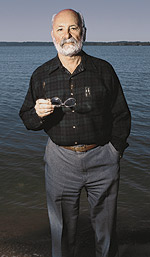Michael Markels has an idea. Actually, he has two. He believes that his ideas can feed the world and solve global warming as well. Markels doesn’t think small.
Markels is an environmental engineer, entrepreneur, and dreamer. He’s semi-retired now, at least in theory, as chairman emeritus of his firm Versar, Inc. But with just a little help from investors, several governments, and some luck, he’ll make his second fortune.
Markels’ core idea is to use iron to increase fish in the ocean. Around 80% of the world’s oceans have low fish populations because phytoplankton—the tiny plant organisms that float in the ocean—are scarce. Oceanographers hypothesize that lack of iron causes the barren areas. Adding iron should increase phytoplankton and thus fish. “The return to the United States and the world from the success of such a program, leading to farming in the three-quarters of the world covered by the oceans, could be great indeed,” Markels says.
And then there’s carbon sequestration. A one-time shot of iron could cause a phytoplankton bloom that would sink to the ocean floor, where it would remain for centuries, taking carbon dioxide from the atmosphere. While Markels is a skeptic on global warming, such sequestration could decrease atmospheric levels of carbon dioxide. (Ocean fish farming would also have some carbon sequestration benefits, as some of the organic material produced would also sink to the ocean bottom.)
There have been five field experiments fertilizing the ocean with iron, including two by Markels. All produced an increase in phytoplankton growth. Markels has patented his process, an innovative use of an industrial by-product to form chelated iron. Iron in a chelated form is slower to precipitate in the ocean, and Markels’ innovation will increase the efficiency of iron fertilization.
Markels faces technical and institutional challenges. The process must still be perfected. Along with fertilizer, it may be necessary to add anchovies or other filter-feeder fish as food for tuna, swordfish, bonita, or other species with commercial value.
The biggest hurdle, however, is the nature of ocean fisheries. They are a commons, and government controls have not been able to restrain overfishing in most of them. The United Nations Food and Agriculture Organization estimates that 68 percent of the world’s fisheries are harvested at or above their maximum sustainable level.
Markels is handicapped by his inability to secure ownership of the fish he produces. It will not be economical to increase fish production without some guarantee that Markels’ company can benefit.
Markels is approaching this problem on three fronts. First, many Pacific nations are leasing ocean fishing rights in parts of their territorial waters, and Markels already has an agreement with the Marshall Islands. Second, he would like to see the United States follow suit by selling fishing rights to individuals. Finally, if private rights are not available, perhaps the United States or other governments would pay Markels to fertilize ocean waters to enhance all commercial marine fishing.
Private initiatives to increase the supply of marine fish are not a new idea. Off the Gulf Coast, fishers purchase and install artificial reefs, increasing the catch of red snapper. Unfortunately, the person who installs the reef does not own it and has no guarantee of reaping the benefits of greater fish production. So fishers jealously guard the location of their reefs.
The New Zealand government allows ownership and trading of individual transferable quotas (ITQs), which give fishers property rights. The halibut fisheries of Alaska and British Columbia have similar tradeable quotas. And oyster beds off the Washington coast are privately owned (ownership that goes back before Washington became a state).
A useful analogy for the problems that Markels faces can be found in the development of agriculture on terra firma. The huge increases in crop yields over the past 80 years or so would not have been possible if individual landowners could not have benefited from the use of commercial fertilizer and improved seed. If my neighbors can harvest my fields, then I have little incentive to increase yields.
A second obstacle to Markels’ dreams is fear of the unknown. Critics worry that adding iron to the ocean will change the biological systems of the oceans. But, as Markels points out, iron is added to the ocean naturally. Winds carrying iron from the Gobi desert increase salmon production off the coast of Alaska. Peru’s huge fisheries exist because of iron rising from the bottom of the sea.
Markels describes conventional wisdom as follows: “Don’t do anything unless you know all of the consequences. All harm is permanent and can never be reversed.” But Markels thinks that the planet is in better shape than it ever has been. Food is less expensive and human beings are living longer and healthier lives. “When society encounters new problems, like air pollution, solutions are found,” Markels says. “If something bad happens, we’ll stop what we’re doing.”
Unfortunately, Markels is likely to be stymied without changes in the way that the oceans are governed. Property rights would solve overfishing generally. And they would allow Markels the opportunity to embark upon one last entrepreneurial adventure, one likely to benefit us all.
Blake Hurst is a free-lance writer who also spends time working on his family farm and nursery in northwestern Missouri. Michael Markels can be reached at mmarkels@aol.com.



